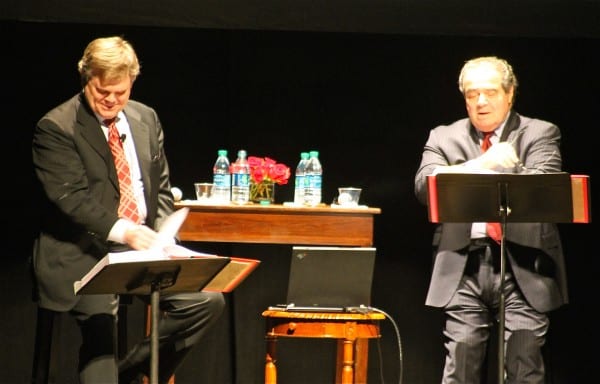
U.S. Supreme Court Justice Antonin Scalia, right, reads from his new book, ‘Reading Law: The Interpretation of Legal Texts,’ alongside SMU professor and co-author Bryan Garner. (Anna Waugh/Dallas Voice)
U.S. Supreme Court Justice Antonin Scalia told an audience at Southern Methodist University on Monday night that he hasn’t previously “expressed [his] views” on marriage equality or gun control.
The comment came while Scalia and SMU professor Bryan Garner were lecturing on their new book, Reading Law: Interpretations of Legal Texts. Part of the lecture focused on interpreting texts in the context in which they were written.
Garner explained that someone can personally disagree with a text but can agree on its interpretation. He explained that he and Scalia differ on gun control and marriage equality because he favors both. Scalia countered that he hadn’t expressed his views on either topic and left it at that.
Scalia’s statement seems at odds with his dissenting opinion in Lawrence v. Texas, which declared state sodomy laws unconstitutional. In the opinion Scalia wrote:
“State laws against bigamy, same-sex marriage, adult incest, prostitution, masturbation, adultery, fornication, bestiality, and obscenity are likewise sustainable only in light of Bowers’ validation of laws based on moral choices. Every single one of these laws is called into question by today’s decision; the Court makes no effort to cabin the scope of its decision to exclude them from its holding.”
Scalia has publicly defended his anti-gay views in the past, including at a similar lecture at Princeton University in December. His hesitancy to clarify his views Monday night in response to Garner could be in light of the Supreme Court preparing to hear two cases related to marriage equality, one challenging California’s Prop 8 and the other challenging the federal Defense of Marriage Act.
Garner said that while he and Scalia differ on a wide range of political points, the two worked through 700 cases for the book and didn’t disagree on any of the legal decisions. But Scalia also said that no judge should be content with all his rulings.
“The judge who always like the results he reaches is a bad judge,” he said. “It means he’s doing something wrong.”
Scalia has often called the U.S. Constitution a dead document and last night was no different. He said the Constitution couldn’t be interpreted in modern day language because it would change the meaning of the text.
“It’s not a living document. It’s dead. Dead, dead, dead,” he said, adding later that dead is not a good description. “It’s an enduring document, not a dead one. … The idea of a living document is so contrary to democratic self-government. I can’t believe how it has come to be so widely accepted.”
















